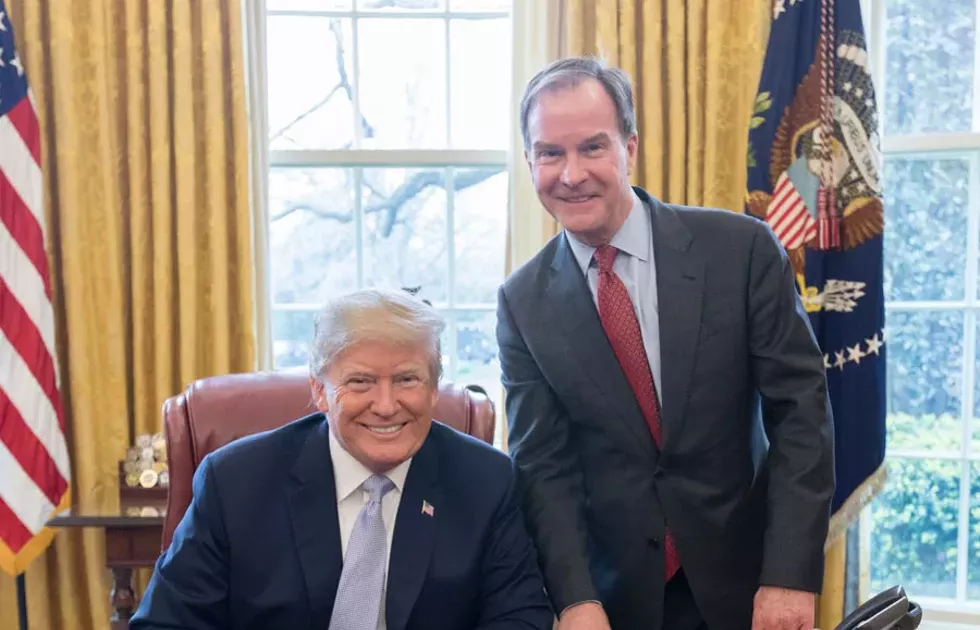Things are looking rather grim for Bill Schuette's campaign going into the final weeks of Michigan's race for governor. Polls have shown the Republican attorney general trailing his gubernatorial rival Democrat Gretchen Whitmer by more than 10 points. Outgoing Republican Gov. Rick Snyder has refused to endorse him, as has the reliably conservative editorial board of The Detroit News. (Breaking with tradition, only the paper's editorial columnists Nolan Finley and Ingrid Jacques signed on to an endorsement.) Schuette has, however, earned the support of President Donald Trump and Trump's former advisor Steve Bannon, but that might not be worth much in a state where Trump barely won in 2016 anyway, and where Trump now has a 54 percent disapproval rating, at least according to one recent poll.
As the campaign enters its final stretch and the inevitable barrage of dubious campaign mailers and TV spots ramps up, it's worth looking back at Schuette's seven-year career as attorney general for an idea of what kind of governor he might make — and why the thought of a Schuette governorship has his critics spooked.
"I don't think Bill Schuette is very good at his job," says Sam Inglot, deputy communications director at advocacy group Progress Michigan. "I don't think he's a very good lawyer for the people of Michigan, not only because of the cases that he has decided to take up or not take up, but also in the fashion that he has lost some very big cases, and frankly embarrassed Michigan and his post."
"It reads like a right-wing playbook of how to act as an attorney general if you want to carry the water for your corporate donors, and be a good ambassador to this Republican brand, with the idea of getting into a higher office," Inglot says.
Looking at Schuette's AG career, critics like Inglot say, one can trace a clear pattern. Though his Twitter handle is @SchuetteOnDuty, that duty is not to the Constitution and the people of Michigan, but rather to his party and political allies, his donors, and his own career — and demonstrating plenty of hypocrisies along the way. (Schuette's campaign declined multiple requests to be interviewed by Metro Times.)
Marijuana
Schuette's battle against marijuana predates his time as attorney general, back when he unsuccessfully led the campaign against the 2008 ballot proposal to legalize medicinal marijuana. By the will of the voters, the proposal passed, but Schuette's antagonism against pot would only continue once he became attorney general.
As AG, Schuette was able to continue to fight against marijuana through a strict interpretation of the law. Since the 2008 law did not directly reference dispensaries, Schuette's office successfully argued against their legality before the Michigan Supreme Court in 2013, which led to prosecutions against medical marijuana defendants, as well as dispensaries getting shut down across the state. In other words: OK, sure, medicinal marijuana is legal, but there's nowhere for you to buy it.
Beyond that, Schuette argued that federal law supersedes state law, and that since marijuana was illegal under federal law, for example, police could not return confiscated marijuana to patients. This year, when U.S. Attorney General Jeff Sessions rescinded a memo that protected states that had legalized marijuana from federal enforcement, Schuette was silent. Meanwhile, Democratic Michigan AG candidate Dana Nessel called the move "a gross display of federal overreach for Sessions to subvert states' rights and return to failed policies that harm families, fill prisons with nonviolent people, cost states billions of dollars they don't have to spare, and do nothing to combat the real drug epidemic facing this nation."
On November's Proposal 1 to legalize marijuana for recreational use, Schuette has said he will "respect to the will of the voters." But in the case of medicinal marijuana, Schuette does not appear to be willing to do that.
Affordable Care Act
Schuette's deference to federal law on marijuana is interesting because when it came to Republicans' favorite bogeyman President Barack Obama's Affordable Care Act, Schuette has shown it anything but that. As AG, Schuette has joined nine lawsuits to block the ACA on the grounds of what he considers to be constitutional overreach and the need to protect religious freedoms.
Among the suits were a 2011 lawsuit that challenged the authority of the federal government to force citizens to purchase health insurance and challenged expansion of Medicaid as a violation of state sovereignty. Six of the lawsuits supported for-profit companies that wanted to avoid insurance coverage for birth control on the grounds that doing so would violate their religious beliefs.
But the ACA also expanded coverage to include people with pre-existing conditions, which Schuette has maintained on the campaign trail that he wants to protect — even as he has fought relentlessly to dismantle Obama's law, and has so far failed to provide a solution as to how he can accomplish both.
Emergency manager law
Another example of Schuette bucking the will of the people is Michigan's emergency manager law. When the people of Michigan rejected his emergency manager law at the ballot in 2012, Snyder promptly rammed through a new version that couldn't be rejected by voters by attaching it to appropriations.
A federal lawsuit filed against the state argued that the EM statute violates the rights of local voters — and that since the EM law is primarily used on poor, majority black cities, it is a racist subversion of democracy. In response, Schuette's lawyers argued, essentially, that voters don't have a constitutional right to choose their local government leaders — only the right to elect state officials.
Flint
The emergency manager law has had disastrous effects on Michigan — the worst of them, inarguably, is the Flint water crisis. It was under emergency management that the city made the decision in 2014 to switch the city's water source from Detroit to the Flint River while the new Karegnondi pipeline was being built — a decision that ultimately resulted in exposing the city's population to lead through tainted drinking water. Even a Snyder-appointed task force concluded that the crisis was the result of a "series of government failures."
On the campaign trail, Schuette has taken credit for bringing criminal cases against more than a dozen government officials involved in the crisis. However, critics say he's just trying to have his cake and eat it too: Under Schuette, the state has fought back ferociously against a multitude of lawsuits filed on behalf of the citizens of Flint, including 10 class-action lawsuits filed in federal court and more than 500 individual suits in state and federal court — at a cost of more than $20 million.
The hypocrisy continues. Last year, attorneys working for Schuette tried to defeat a requirement for the state to provide bottled water to Flint residents while at the same time, Schuette attempted to file an amicus brief arguing that the state should continue supplying the water. A federal judge called Schuette out for "superficial posturing," or trying to play both sides for political gains. Speaking of playing both sides, as far as Schuette's Flint criminal charges go, it's worth noting that nobody has yet gone to jail over the water crisis.
Marriage equality
Quite possibly Schuette's biggest embarrassment as AG was his long, drawn-out, and ultimately ill-fated battle against same-sex marriage. Ironically for Schuette, the legal battle is what made Democratic AG candidate Nessel a household name. She was lead attorney in the case of DeBoer v. Gov. Rick Snyder, which challenged the bans on adoption and marriage for same-sex couples in Michigan; that case ultimately got folded into the landmark 2015 Supreme Court case Obergefell v. Hodges.
In court, Schuette invited "expert" witnesses (read: fringe wackos) to testify that children raised by same-sex couples are more likely to commit crimes, among other dubious claims. They, and Schuette, were basically laughed out of the court, and the question was eventually settled at the federal level once and for all. Schuette's failed crusade against LGBTQ rights ultimately resulted in wasting nearly $2 million in taxpayer money.
Schuette's battle against LGBTQ rights didn't end there. He also defended against, and lost, a legal challenge to Michigan's law that prohibited certain public employers from covering same-sex partners of employees for health insurance, as well as a challenge to the state's refusal to recognize more than 300 same-sex marriages granted in 2014. These failed pursuits cost the state millions more.
In addition to that, Schuette's office had also opposed expanding Michigan's Elliott-Larsen Civil Rights Act to cover LGBTQ discrimination (though Schuette now says he is open to it), and joined a lawsuit to deny equal protection to transgender students in schools.
Education
To date, Schuette has taken more than $130,000 in campaign cash from Trump's Secretary of Education Betsy DeVos and her family, and it's no surprise he has become a staunch defender of her, even as her policies have resulted in sub-par education in Michigan.
In 2016, a suit filed on behalf of Detroit public and charter school students argued that the city's emergency manager-run schools were so dysfunctional and mismanaged that they were effectively denied the ability to learn how to read; Schuette argued students have "no fundamental right to literacy," and a federal judge dismissed the case.
Then there's the "3 percent case," where Schuette fought for six years against teachers getting a collective $550 million the state had illegally deducted from their paychecks. As another example of Schuette's opportunism, once the Michigan Supreme Court eventually ruled that the teachers were in fact owed their money, the AG suddenly changed his tune, and had his communications director write a tweet that said he "strongly agrees" with the Supreme Court decision.
What was it all for, then? As Whitmer criticized, it's all part of Schuette's strategy: "Wear the little guy down, and then you can do anything you want."
Youth in prison
Another bitter legal battle came in the case of a class action lawsuit filed on behalf of prison inmates locked up for life as juveniles, which Schuette fought against for years.
In 2012, the U.S. Supreme Court ruled that mandatory life-without-parole sentences for juveniles were a form of "cruel and unusual punishment." But even after a federal district court judge determined the inmates should be resentenced, Schuette fought against it, arguing that such a move would "undermine the community's safety." Then this year, the 6th Circuit U.S. Court of Appeals fought back, ruling that the state cannot deny credits for good behavior to prisoners who were sentenced to life as minors, with Judge Jane Branstetter writing, "It is now time to devote the energies of the parties to rectifying the constitutional harm suffered by plaintiffs."
Another juveniles in prison case stemmed from a 2013 suit, where seven male inmates reported being raped or sexually harassed as minors by adults, including prison staff. In another example of Schuette's "wear them out" philosophy, his office repeatedly requested stays to delay the case; a judge called Schuette's strategy "odious." The case is now before the state Supreme Court.
To make things worse, a Huffington Post reporter working on the case was reportedly subpoenaed by Schuette, seeking copies of notes and records relating to interviews that she conducted. After backlash, Schuette's office said it would withdraw the subpoenas.
The environment
And it's not just little people Schuette will trample over to get what he wants politically — the whole planet is fair game, too. In 2016, Schuette filed a petition with the U.S. Court of Appeals to review the EPA's cost calculations for limiting mercury pollution. Here, Snyder parted ways with Schuette, siding with environmentalists while Schuette ultimately lost in court.
Schuette was also part of a group of GOP attorneys general who sued to block the Environmental Protection Agency's Clean Power Plan, which would put higher restrictions on emissions to reduce greenhouse gases. One of the suit's AGs, Scott Pruitt of Oklahoma, was eventually picked by Trump to head — or essentially, neuter — the EPA, and kill the Clean Power Plan.
Earlier this year, Schuette signed onto a federal court filing involving ExxonMobil, arguing that climate change was "an unsettled area of science" and arguing that ExxonMobil should be allowed to downplay climate risks of burning oil and gas as a matter of "free speech."
Partisan gerrymandering
Also on the ballot in November is Proposal 2, a grassroots effort led by Voters Not Politicians which proposes creating an independent commission to redraw Michigan's legislative maps that were drawn by Republicans to favor Republican wins. The Michigan Chamber of Commerce bankrolled, with Schuette's support, a failed attempt to block the VNP proposal; the group had also been directly involved in working with Republicans to draw the gerrymandered maps and has officially endorsed Schuette's campaign.
Stay on top of Detroit news and views. Sign up for our weekly issue newsletter delivered each Wednesday.








